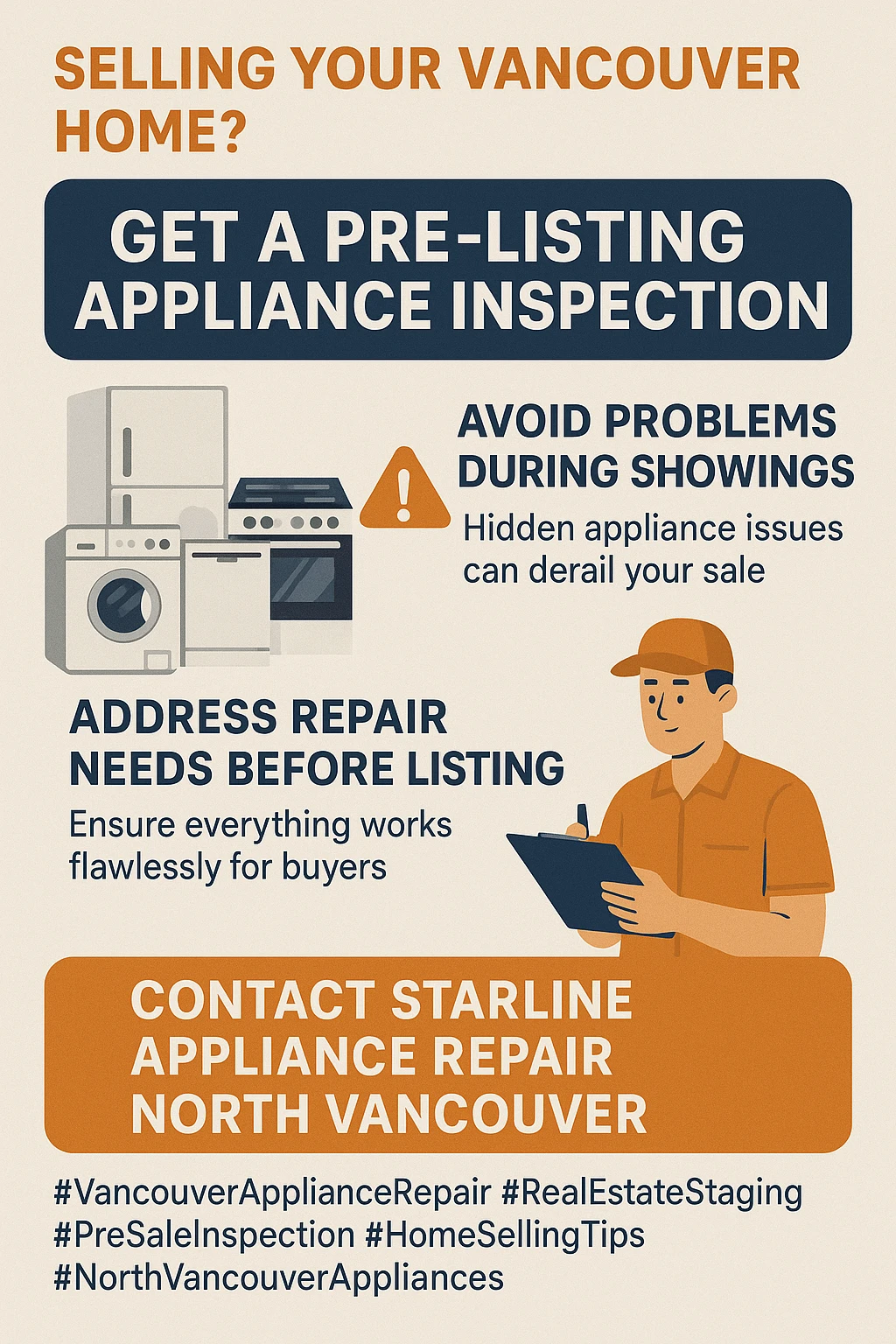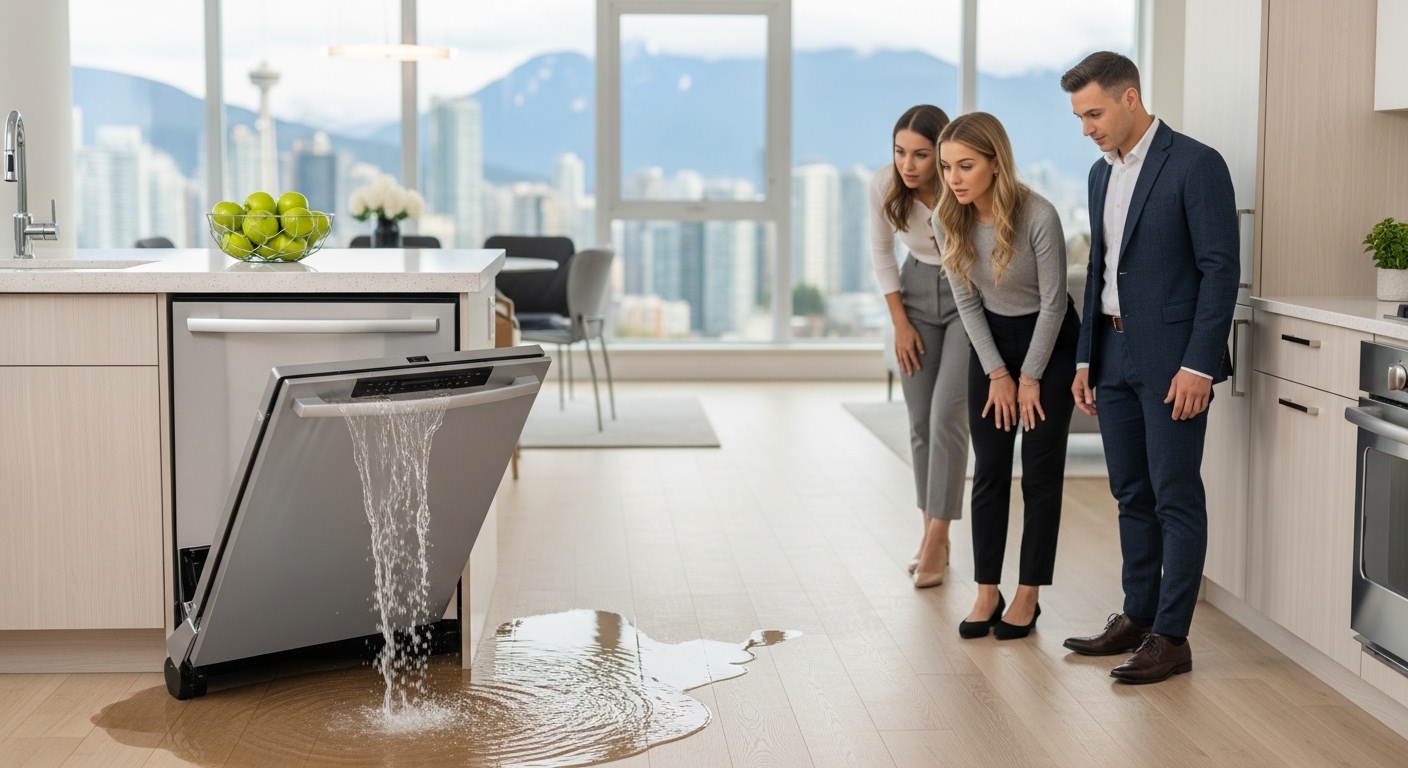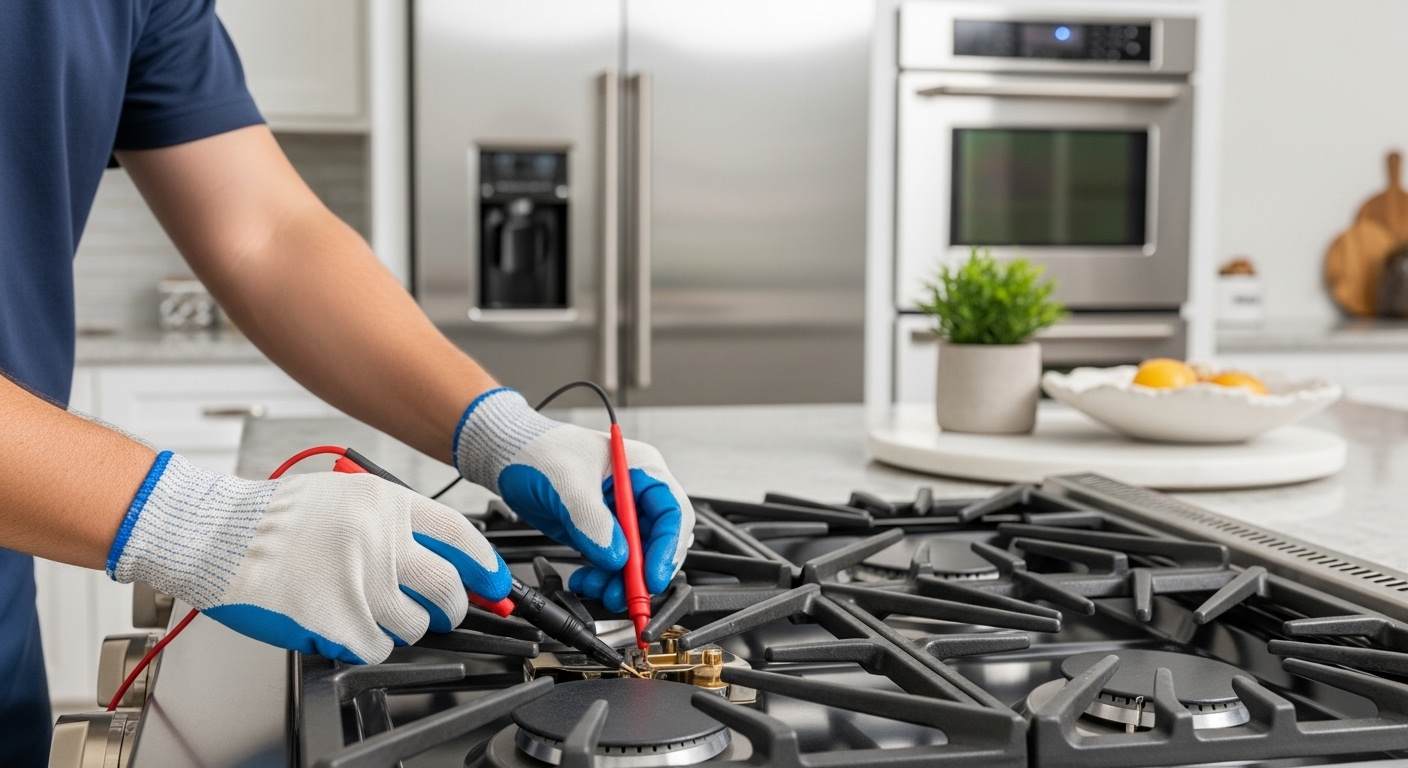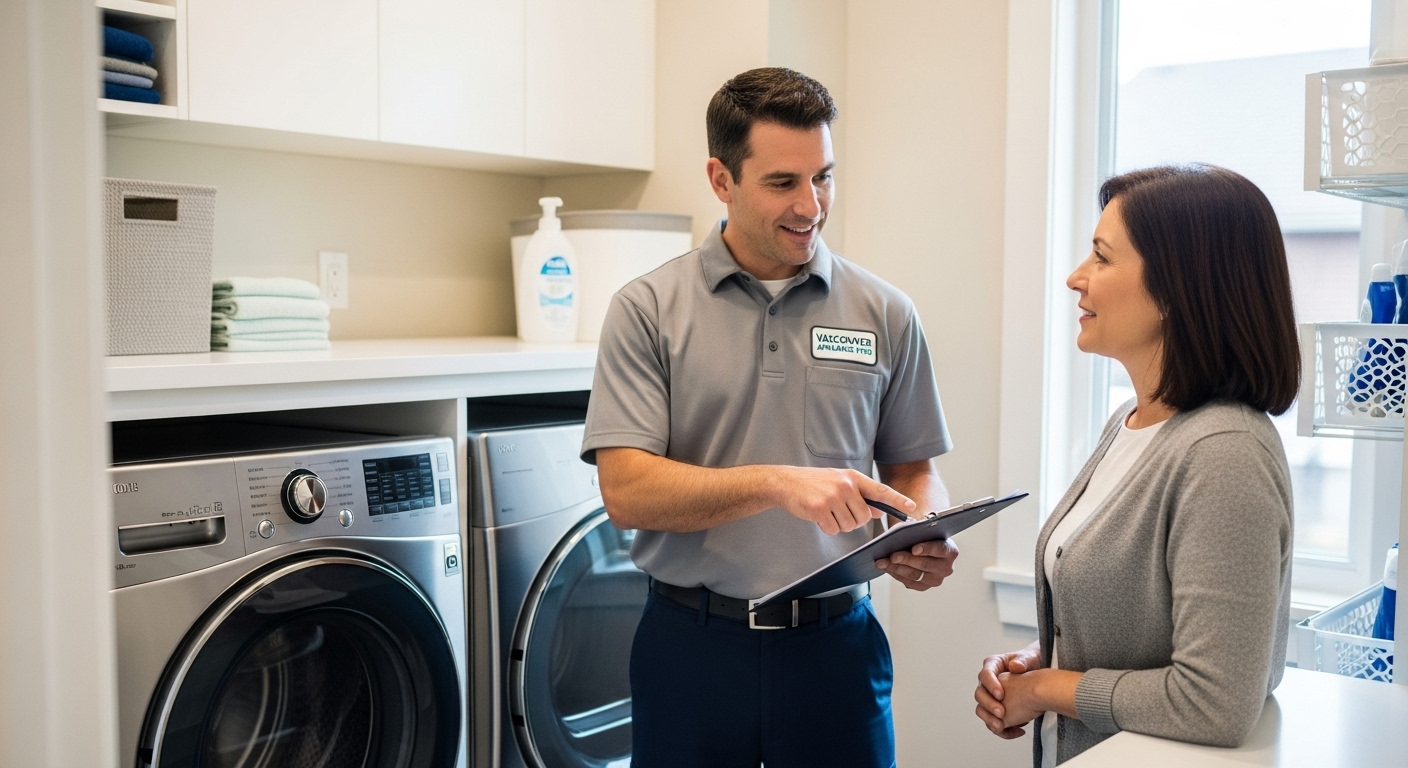How Vancouver’s Open House Staging and Real Estate Showings Are Overworking Your Appliances: A Property Owner’s Guide to Pre-Sale Appliance Health Checks
Thinking about listing your Vancouver property but worried about appliance breakdowns during showings? Discover how the city’s intensive staging process can push your home’s systems to their breaking point and what smart sellers do to protect their investment.Picture this: you’ve invested thousands in professional staging, your Vancouver home looks magazine-perfect, and potential buyers are booking showings left and right. Then disaster strikes during a weekend open house – your dishwasher starts leaking all over the hardwood, or worse, your oven stops working while a buyer’s agent is demonstrating the kitchen’s “gourmet capabilities.” This nightmare scenario plays out more often than you’d think in Vancouver’s competitive real estate market. Vancouver’s coastal climate and intensive showing schedule create a perfect storm for appliance failures. With staged homes typically seeing 25-50 showings before sale, your appliances endure constant demonstration stress that can reveal problems at the worst possible time. The humid, salt-laden air doesn’t help either – it reduces appliance lifespan by 20-30% compared to inland properties, making pre-sale inspections absolutely crucial for protecting your listing timeline and sale price.Smart sellers have learned that a proactive appliance health check isn’t just good maintenance – it’s essential risk management. While emergency repairs during active listings can cost $800 or more, a comprehensive pre-sale inspection runs just $200-400 and often prevents costly surprises that can derail negotiations or delay closing dates.
Key Outtakes:
- Vancouver’s coastal climate reduces appliance lifespan by 20-30% compared to inland properties, making pre-sale inspections crucial for preventing costly surprises
- Staged homes typically see 25-50 showings before sale, putting appliances under constant demonstration stress that can reveal hidden problems during critical buyer visits
- Emergency appliance repairs during active listings cost $500-800 before parts, potentially derailing sales negotiations and extending time on market
- BC’s Property Condition Disclosure Statement laws require sellers to report known appliance defects, making proactive inspection a legal necessity
- Professional pre-sale appliance inspection costs $200-400 but can prevent $1,000+ in emergency repairs and protect your sale timeline

The Hidden Costs of Vancouver’s Intensive Real Estate Staging Process
Vancouver’s competitive real estate market demands exceptional presentation, but the intensive staging and showing process puts tremendous stress on your home’s appliances. Understanding these hidden pressures helps explain why so many sellers face unexpected breakdowns during their most important selling period.The staging period transforms your home into a constantly operating showroom. Professional staging companies run appliances repeatedly during buyer visits to demonstrate functionality and create that “lived-in” feeling buyers crave. Kitchen appliances bear the brunt of this treatment, with ovens fired up for aroma, dishwashers run for sound demonstrations, and refrigerators opened dozens of times daily. This staging period appliance usage can exceed normal monthly usage in just 2-3 weeks of intensive showings.Vancouver’s coastal environment compounds these stresses in ways many homeowners don’t realize. The salt air that makes our city so beautiful also accelerates corrosion on appliance internal components, while high humidity creates perfect conditions for mold growth and electrical connection issues. Vancouver’s coastal climate reduces appliance lifespan by 20-30%, requiring more frequent maintenance than properties in drier climates.The extended market exposure that staging enables creates additional complications. While staged homes sell faster on average, they still spend about 25 days on market in Vancouver’s current conditions. During this period, vacant home staging requires appliances to run continuously for ambiance – heating systems maintaining perfect temperature, lighting on timers, and kitchen appliances cycling regularly to prevent that “vacant home” feel that turns buyers away. Greater Vancouver region recorded 26,561 residential sales in 2024, representing increased competition and longer staging periods as sellers fight for buyer attention.This constant operation during the most critical period of your sale creates a dangerous vulnerability. Appliances that might have limped along for months under normal use suddenly face intense scrutiny from potential buyers who test every switch, knob, and cycle. When problems emerge during showings, they don’t just cost money – they cost credibility and can completely derail a promising sale negotiation. 
Pre-Sale Appliance Inspection Checklist for Vancouver Properties
A systematic appliance inspection before listing protects your investment and prevents embarrassing failures during buyer showings. Vancouver’s unique climate and market conditions require special attention to specific appliance vulnerabilities that might not be obvious during casual daily use.  Kitchen appliances demand the most thorough evaluation since they’re always a major consideration for potential buyers who examine age, condition, color, and style to formulate opinions about kitchen functionality and design. Start with range and oven temperature calibration verification – variations of more than 25 degrees from the set temperature indicate internal problems that savvy buyers will notice immediately. The paper towel method works perfectly for dishwasher leak detection: place paper towels around the base and run a full cycle, checking for any moisture that might indicate seal problems or loose connections.Refrigerator assessment goes beyond simple cooling function. Test ice maker operation, check for consistent temperatures in different compartments, and listen for unusual noises that might indicate compressor issues. Door seals deserve special attention in Vancouver’s humid climate, where poor seals allow moisture infiltration that forces the unit to work harder and increases energy costs – something energy-conscious buyers definitely notice.Laundry equipment faces unique challenges in Vancouver’s moisture-rich environment. Front-loading washers are particularly vulnerable to mold growth in door seals and detergent dispensers, a common issue in our humid climate. Test washer spin cycle balance and drainage verification by running a load and checking for proper water evacuation and balanced operation. Dryer heating element function requires testing with actual loads, not just brief operation, while vent system inspection ensures proper exhaustion to prevent moisture buildup that can damage your home’s structure.The electrical systems supporting your appliances need careful evaluation, especially in older Vancouver homes where upgrades might not have kept pace with appliance power demands. GFCI outlet testing throughout the property ensures safety compliance that inspectors and buyers will verify. Circuit breaker panel inspection should look for signs of overheating, corrosion, or overloaded circuits that could indicate electrical system inadequacy. Don’t overlook appliance electrical connections and cord conditions – frayed cords or loose connections create safety hazards that will immediately concern any qualified buyer.Water quality variations across Metro Vancouver create specific appliance challenges that informed sellers address proactively. Richmond and Burnaby areas’ hard water causes premature scale buildup in dishwashers, coffee makers, and washing machines. Even if your appliances currently function, scale buildup reduces efficiency and creates noise issues that become apparent under the intensive testing of buyer showings.
Kitchen appliances demand the most thorough evaluation since they’re always a major consideration for potential buyers who examine age, condition, color, and style to formulate opinions about kitchen functionality and design. Start with range and oven temperature calibration verification – variations of more than 25 degrees from the set temperature indicate internal problems that savvy buyers will notice immediately. The paper towel method works perfectly for dishwasher leak detection: place paper towels around the base and run a full cycle, checking for any moisture that might indicate seal problems or loose connections.Refrigerator assessment goes beyond simple cooling function. Test ice maker operation, check for consistent temperatures in different compartments, and listen for unusual noises that might indicate compressor issues. Door seals deserve special attention in Vancouver’s humid climate, where poor seals allow moisture infiltration that forces the unit to work harder and increases energy costs – something energy-conscious buyers definitely notice.Laundry equipment faces unique challenges in Vancouver’s moisture-rich environment. Front-loading washers are particularly vulnerable to mold growth in door seals and detergent dispensers, a common issue in our humid climate. Test washer spin cycle balance and drainage verification by running a load and checking for proper water evacuation and balanced operation. Dryer heating element function requires testing with actual loads, not just brief operation, while vent system inspection ensures proper exhaustion to prevent moisture buildup that can damage your home’s structure.The electrical systems supporting your appliances need careful evaluation, especially in older Vancouver homes where upgrades might not have kept pace with appliance power demands. GFCI outlet testing throughout the property ensures safety compliance that inspectors and buyers will verify. Circuit breaker panel inspection should look for signs of overheating, corrosion, or overloaded circuits that could indicate electrical system inadequacy. Don’t overlook appliance electrical connections and cord conditions – frayed cords or loose connections create safety hazards that will immediately concern any qualified buyer.Water quality variations across Metro Vancouver create specific appliance challenges that informed sellers address proactively. Richmond and Burnaby areas’ hard water causes premature scale buildup in dishwashers, coffee makers, and washing machines. Even if your appliances currently function, scale buildup reduces efficiency and creates noise issues that become apparent under the intensive testing of buyer showings.
Cost Analysis: Repair vs. Replace Before Listing
Understanding repair versus replacement economics helps sellers make smart financial decisions that protect their sale timeline and maximize return on investment. Vancouver’s unique market conditions and service costs create specific calculation parameters that differ significantly from other markets.The 50% rule provides your foundational decision framework: repairs become worthwhile when costs stay under 50% of replacement value. However, Vancouver’s premium repair costs require careful calculation. Local repair services often cost $200-500 for typical repairs, while new appliances start around $1,000 plus installation, making the mathematics more complex than simple percentage calculations suggest. Age considerations add another critical layer to these decisions. Appliances under 8-10 years old usually merit repair investment, especially when you consider that buyers often view newer appliances as indicators of overall home maintenance quality. However, appliances approaching 15-20 years face replacement pressure regardless of current functionality, since buyers correctly assume that older units will require replacement soon after purchase.Emergency repair cost implications can completely destroy your selling timeline and budget. Same-day emergency repairs add $50-200 premiums to standard service calls, while emergency appliance repairs cost $500-800 before parts. More importantly, repair delays extend your listing timeline, increasing carrying costs and potentially causing you to miss optimal selling windows in Vancouver’s seasonal market patterns.The investment return calculation on pre-sale repairs often surprises sellers with its positive impact. Strategic appliance updates can recover 100% of investment in sale price, particularly in Vancouver’s competitive market where buyers often choose between similar properties based on move-in readiness. Statistics consistently show that monetary investment in kitchen appliances provides very safe returns, with most sellers recovering their full investment after sale.Consider the total cost of appliance failure during active listing. Beyond immediate repair costs, appliance problems create negotiation leverage for buyers, reduce final sale price, and damage your reputation with real estate agents who expect seamless showings. A single appliance failure can easily cost you thousands in lost value and extended time on market, turning your carefully staged property into a cautionary tale.
Age considerations add another critical layer to these decisions. Appliances under 8-10 years old usually merit repair investment, especially when you consider that buyers often view newer appliances as indicators of overall home maintenance quality. However, appliances approaching 15-20 years face replacement pressure regardless of current functionality, since buyers correctly assume that older units will require replacement soon after purchase.Emergency repair cost implications can completely destroy your selling timeline and budget. Same-day emergency repairs add $50-200 premiums to standard service calls, while emergency appliance repairs cost $500-800 before parts. More importantly, repair delays extend your listing timeline, increasing carrying costs and potentially causing you to miss optimal selling windows in Vancouver’s seasonal market patterns.The investment return calculation on pre-sale repairs often surprises sellers with its positive impact. Strategic appliance updates can recover 100% of investment in sale price, particularly in Vancouver’s competitive market where buyers often choose between similar properties based on move-in readiness. Statistics consistently show that monetary investment in kitchen appliances provides very safe returns, with most sellers recovering their full investment after sale.Consider the total cost of appliance failure during active listing. Beyond immediate repair costs, appliance problems create negotiation leverage for buyers, reduce final sale price, and damage your reputation with real estate agents who expect seamless showings. A single appliance failure can easily cost you thousands in lost value and extended time on market, turning your carefully staged property into a cautionary tale.
Frequently Asked Questions About Pre-Sale Appliance Inspections in Vancouver
- How much does a pre-sale appliance inspection cost in Vancouver?
- A comprehensive inspection typically costs between $200 and $400, depending on the number of appliances and the complexity of your home’s systems. This is a small investment compared to the $800+ cost of emergency repairs during a listing.
- Do I legally have to disclose appliance problems?
- Yes. British Columbia’s Property Condition Disclosure Statement requires sellers to disclose any known defects, including those in appliances. A pre-sale inspection helps you fulfill this legal obligation accurately.
- Will new appliances increase my home’s value?
- While you may not see a dollar-for-dollar return, new or well-maintained appliances significantly increase a property’s marketability and perceived value. They signal to buyers that the home is well-cared for and move-in ready, which can lead to faster offers and a stronger negotiating position.
- Can I perform the inspection myself?
- While a basic visual check is helpful, a professional technician has the diagnostic tools and experience to identify hidden issues like failing compressors, electrical faults, or internal leaks that a homeowner would miss. Professional inspection provides peace of mind and a documented report that can be shared with potential buyers.
Wrapping Up: Proactive Maintenance as a Sales Strategy
In Vancouver’s high-stakes real estate market, leaving your appliance health to chance is a risk you can’t afford. A proactive pre-sale inspection transforms potential liabilities into selling points, demonstrating your commitment to quality and transparency. By investing a few hundred dollars upfront, you protect yourself from thousands in potential losses, ensure a smoother sales process, and give buyers the confidence they need to make their best offer. Don’t let a preventable appliance failure derail your sale – schedule a professional health check and list your property with confidence.

